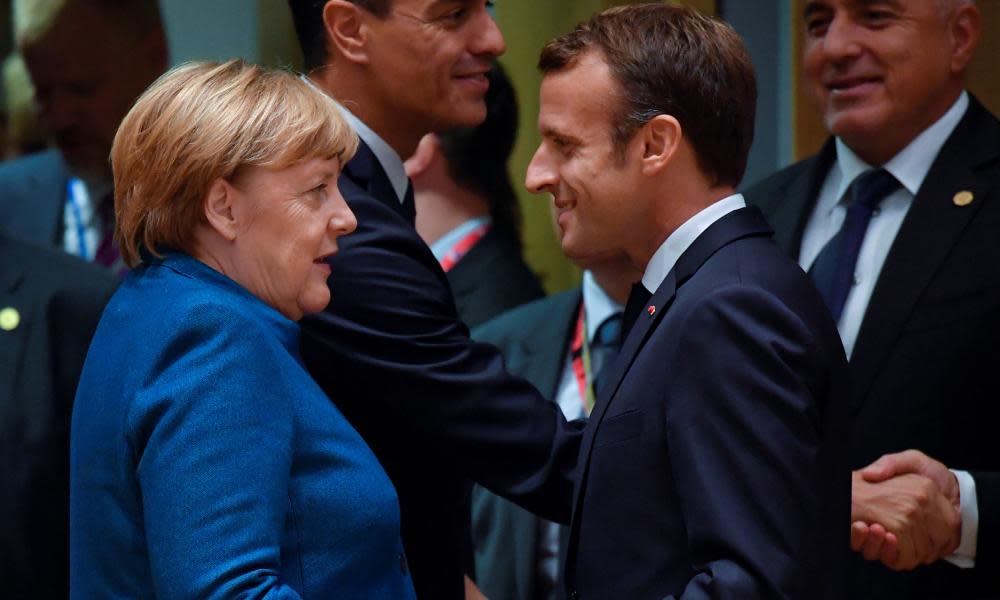As Angela Merkel’s star dims, Europe is facing perhaps its biggest challenge since 1930s

Angela Merkel’s political obituary has been written many times since last year’s bruising federal election, when her centre-right Christian Democratic Union (CDU) slumped to 33% of the vote. Since then, the fortunes of the CDU – and its sister party, Bavaria’s Christian Social Union (CSU) – have continued to decline. If today’s state election in Hesse goes as expected, it will be seen as another crushing, possibly fatal, rebuff for Germany’s chancellor.
Merkel has survived this long because she stands head and shoulders above her rivals. In office since 2005, and serving a fourth term, she is widely regarded, inside and outside Germany, as Europe’s de facto leader. Clear political principles, exemplified by her brave, open-door migration policy and willingness to stand up to Donald Trump, coupled with a pragmatic sense of what’s possible, have sustained her this far.
The fracturing of the German party system has also helped keep her in power – but it could yet prove her undoing. Her main coalition partner, the Social Democrats (SPD), recorded its worst post-war result last year, attracting only 20% of support, while the Greens, the Free Democrats, Die Linke (the Left), and the far-right Alternative für Deutschland (AfD) all gained ground. The SPD faces a repeat meltdown in Hesse. If that does happen, rising pressure within that party to quit the ruling coalition may be irresistible.
Annegret Kramp-Karrenbauer, the CDU general secretary, who is said to be Merkel’s preferred successor, warned last week the departure of SPD would trigger a general election. With the CDU polling at 26-27% nationally, the prospect of a drubbing in new federal polls could bring Merkel’s reign to an abrupt halt.
The end of the Merkel era could have dire implications for the future cohesiveness of Europe and the EU. The timing could hardly be worse, as political fragmentation and polarisation reach epidemic proportions. Of the two other leading regional powers, Britain, a traditional ally of Berlin, has become a liability, wholly preoccupied with a mutually damaging Brexit process that is setting a worrying EU precedent.
In France, meanwhile, the shine has come off Emmanuel Macron only 18 months after his insurrectionary electoral clean sweep. His unpopular labour market reforms have not produced the promised results: unemployment is rising again, towards 10%, and economic growth is falling. He has been damaged by high-profile resignations, his mishandling of an Elysée scandal, and his irksome, quasi-Napoleonic arrogance. His personal approval ratings are below 30%.
As a leader on the international stage, Macron is also proving a divisive figure, very different from Merkel. Casting himself as Europe’s champion against the rising forces of illiberalism and populism, he recently picked a fight with Viktor Orbán, Hungary’s nationalist leader, and Italy’s hard-right deputy prime minister, Matteo Salvini.
Macron characterises the two men, and likeminded politicians in Poland and elsewhere, as a danger to cherished EU principles of open borders, open markets and open societies. “If they want to see me as their principal opponent, they are right. I will cede nothing to the nationalists and their language of hate,” he declared grandly.
As analyst Robert Zaretsky argues, Macron’s attempt to impose an either-or choice, in the manner of Charles de Gaulle, could engender even greater polarisation at a time when Europe’s established political order is breaking up. “Insisting upon the division between liberalism and illiberalism obscures the inconvenient truth that a range of alternatives exists between these ideological poles,” Zaretsky wrote. “As the French socialist Pierre Moscovici noted, ‘Not all pro-Europeans have the same ideas’.”
As Merkel’s star dims, Macron may try to use next May’s crucial EU parliamentary elections to claim the mantle of Europe’s leader and revive his standing at home. Salvini, leader of Italy’s hard-right Lega, has similar ideas about the watershed nature of May’s polls. He and France’s Marine Le Pen view the vote as a decisive moment for Europe’s future direction. They plan to campaign for a “Europe of nations” free of Brussels’ collectivist, dirigiste embrace.
Salvini and his allies in Italy’s populist Five-Star Movement directly challenged the EU last week with a high-spending national budget proposal that flouts Brussels’ rules on debt and threatens to sink Macron’s plans for further eurozone integration. This defiance is also aimed at Germany, which Salvini’s supporters accuse of Greece-style financial bullying.
If it continues unchecked, this process of internal political fragmentation, spurred by the serial successes of populist-nationalist parties in eastern Europe, the Low Countries and most recently in Sweden, where (like in Germany) the centrist Social Democrats suffered their worst result in living memory, could become an existential upheaval that permanently changes the face of Europe. External threats, from Russia in the east to Trump’s America in the west, add to the sense of looming crisis.
Not since the 1930s, perhaps, has Europe’s political stability, cohesion, and broadly democratic consensus been under greater challenge. Merkel symbolises steadiness, safety and continuity. If, or rather when, she falls, she will be much missed.

 Yahoo News
Yahoo News 
